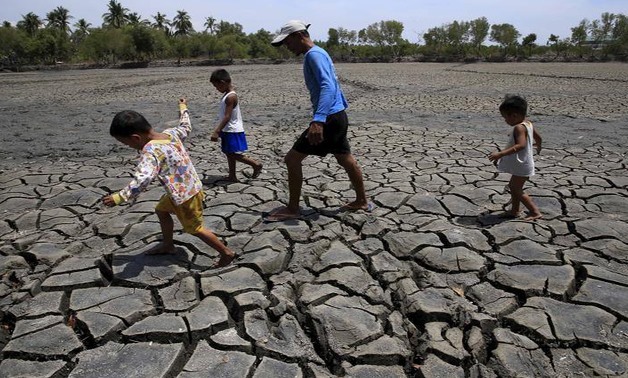
FILE- A father with his children walk over the cracked soil of a 1.5 hectare dried up fishery at the Novaleta town in Cavite province, south of Manila May 26, 2015. REUTERS/Romeo Ranoco/File
NEW YORK - 28 May 2020: The economic fallout of the COVID-19 pandemic could push up to 86 million more children into household poverty by the end of 2020, an increase of 15 percent, according to a new analysis released today by Save the Children and UNICEF.
The analysis highlights that, without urgent action to protect families from the financial hardships caused by the pandemic, the total number of children living below the national poverty line in low- and middle-income countries could reach 672 million by year-end. Nearly two-thirds of these children live in sub-Saharan Africa and South Asia.
Countries across Europe and Central Asia could see the most significant increase, up to 44 percent across the region. Latin America and the Caribbean could see a 22 percent increase.
“The coronavirus pandemic has triggered an unprecedented socio-economic crisis that is draining resources for families all over the world,” said Henrietta Fore, UNICEF Executive Director.
“The scale and depth of financial hardship among families threaten to roll back years of progress in reducing child poverty and to leave children deprived of essential services. Without concerted action, families barely getting by could be pushed into poverty, and the poorest families could face levels of deprivation that have not been seen for decades.”
“The shocking poverty impacts of the Covid-19 pandemic will hit children hard. Children are highly vulnerable to even short periods of hunger and malnutrition—potentially affecting them for their whole life. If we act now and decisively, we can prevent and contain the pandemic threat facing the poorest countries and some of the most vulnerable children. This report should be a wake-up call for the world. Poverty is not inevitable for children,” said Save the Children International CEO, Inger Ashing.
To address and mitigate the impact of COVID-19 on children in poor households, Save the Children and UNICEF call for rapid and large-scale expansion of social protection systems and programs including cash transfers, school feeding, and child benefits – all critical investments that address immediate financial needs and lay the foundation for countries to prepare for future shocks.
Governments must also invest in other forms of social protection, fiscal policies, employment, and labor market interventions to support families. This includes expanding universal access to quality healthcare and other services; and investing in family-friendly policies, such as paid leave and childcare.

Comments
Leave a Comment